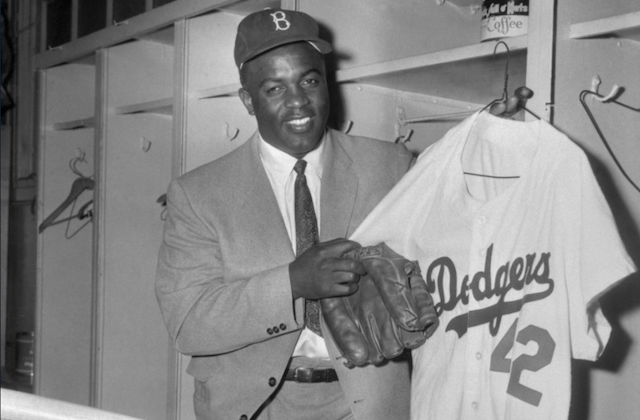Jackie Robinson‘s journey to sports immortality and baseball’s desegregation began on this day, January 31, in 1919, when he was born in Cairo, Georgia.
According to the Society for American Baseball Research (SABR), a non-profit organization dedicated to researching and preserving baseball history, Roosevelt grew up in a family of sharecroppers that moved to Pasadena, California soon after his birth. He proved himself as a talented athlete across multiple sports as he also defended himself from violent attacks by White boys in the predominantly White city. He first encountered national fame as a student athlete at the University of California, Los Angeles, where he excelled in baseball, track, basketball, football and swimming.
The U.S. Army drafted Robinson during World War II, and while enlisted, he began individually protesting against racial segregation in the armed forces. SABR says Robinson refused to play on the football team at Fort Riley in Kansas, where he was stationed, after he was prevented from joining the camp’s segregated baseball team. He almost received a dishonorable discharge during another stint at Fort Hood, Texas, when he dismissed a White bus driver’s orders to sit in the back; he prevailed during a court-martial and instead received an honorable discharge.
Robinson entered the Negro leagues in 1945, playing with the Kansas City Monarchs, before moving to the Montreal Royals of the minor International League the next year. The Brooklyn Dodgers of Major League Baseball (MLB) recruited him soon after. While he officially signed with the Dodgers in 1945, racist pressure from MLB officials and national newspapers prevented Robinson from officially joining the team until April 15, 1947—a date that MLB marks every year by having players wear Robinson’s jersey number 42.
Robinson still encountered racist abuse from other teams and their fans throughout his first year, including Philadelphia Phillies manager Ben Chapman taunting Robinson with the N-word, St. Louis Cardinals players threatening to strike over his presence and Cininnati Reds fans sending him death threats. But his presence opened the doors for other talented Black players to enter the majors. He played with the Dodgers for nearly another decade, being part of a roster that won the 1955 World Series. He announced his retirement in 1957 and joined the National Baseball Hall of Fame. He remained a vocal advocate for sports desegregation and civil rights until his death in 1972.
Like Muhammad Ali and other Black athletes who spoke out against racial injustice, popular history often erases Robinson’s fearless advocacy outside of his most famous desegregation action. The Nation sports editor Dave Zirin reminded the world of this part of his career by tweeting the following thread of notable quotes:
"All these guys who were saying that we’ve got it made through athletics, it’s just not so. You as an individual can make it, but I think we’ve got to concern ourselves with the masses of our people." – Happy 99th birthday to Jackie Robinson
— Dave Zirin (@EdgeofSports) January 31, 2018
"I cannot stand and sing the anthem. I cannot salute the flag; I know that I am a black man in a white world. In 1972, in 1947, at my birth in 1919, I know that I never had it made." – Happy 99th birthday to Jackie Robinson
— Dave Zirin (@EdgeofSports) January 31, 2018
“I wouldn’t fly the flag on the Fourth of July or any other day. When I see a car with a flag pasted on it, I figure the guy behind the wheel isn’t my friend.” – Happy 99th birthday to Jackie Robinson
— Dave Zirin (@EdgeofSports) January 31, 2018
